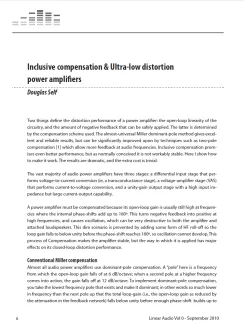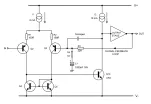Two things define the distortion performance of a power amplifier; the open-loop linearity of the circuitry, and the amount of negative feedback that can be safely applied. The latter is determined by the compensation scheme used. The almost-universal Miller dominant-pole method gives excellent and reliable results, but can be significantly improved upon by techniques such as two-pole compensation which allow more feedback at audio frequencies. Inclusive compensation promises even better performance, but as normally conceived it is not workably stable. Here Douglas shows how to make it work. The results are dramatic, and the extra cost is trivial.
PDF preview
Image

